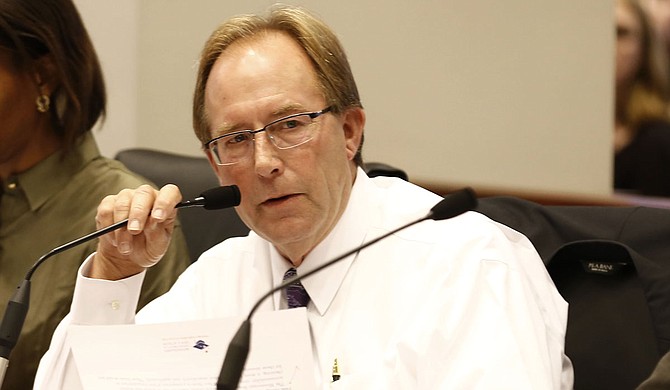Rep. John Moore, R-Brandon, told the House Education Committee that he wants to consolidate the schools 148 school districts down to about 50 in coming years. Photo by Imani Khayyam.
JACKSON — Mississippi would be on the road to 50 or fewer school districts, a new public-education funding formula and more charter schools under legislation the House Education Committee members approved Friday before heading home for the weekend.
The committee voted to consolidate Carroll, Montgomery and Winona school districts and dissolve the Lumberton Public School District into adjoining districts by 2019. Rep. Toby Barker, R-Hattiesburg, explained both consolidation bills to the committee, meeting some resistance from Democrats.
Rep. Sara Thomas, D-Indianola, asked if the consolidation bills were similar to previous consolidation legislation. Barker said they were and that representatives from school districts are able to come and voice their concerns or opinions about consolidation.
"We give everyone the opportunity to come and talk to us—some of them did, and some did not," Barker said.
Barker said all this session's consolidation bills will have lengthened timelines. Many of the state's 148 current school districts will not have to consolidate until 2019, if the current bills become law.
Rep. Gregory Holloway, D-Hazlehurst, asked Barker if any research determined how consolidation could be done more effectively, adding that the Legislature seemed to be piecemealing consolidations together each year.
Holloway asked how much money consolidation saves. He suggested having 82 school districts—one for each county. "It would be more uniform, we would probably save more money. Have we ever looked at the fact that we need to maybe not do all of these separate (consolidations) and try to look at an overall study?" Holloway asked.
Barker didn't have exact numbers for the Lumberton Public School District consolidation, but said it would save money to dissolve one central administration office.
The committee chairman, Rep. John Moore, R-Brandon, said work has already started to look at a larger consolidation strategy in coming years.
"I think you're not going to see 82 (school districts) but something around 50 or less school districts," Moore said. "All of these consolidations are being done (now) for low performance or an inability to operate financially."
Committee Democrats asked to see the specific criteria that the state uses for consolidation, but Barker reiterated what Moore said. He said school districts are consolidated when they consistently under-perform or have a student population that is too small.
The House Education Committee also passed amendments to the state's charter-school law, which include allowing students in C, D and F ranked school districts to attend charter schools and cross district lines to get there. Rep. Charles Busby, R-Pascagoula, told the committee this should be the last charter school-bill they see in not only the session but the term.
Rep. Sonya Williams-Barnes, D-Gulfport, offered an amendment to the bill, which changed language that would require all charter schools to give preference to underserved students. Barnes' amendment changed a part of the bill that says "A charter school may give an enrollment preference to underserved children" to say "A charter school shall give an enrollment preference to underserved children." Her amendment passed, as did the bill.
The committee also passed a bill that will change one component in the Mississippi Adequate Education Program formula, average daily attendance, which is used to calculate a school district's number of students, to average daily membership.
Average daily attendance is calculated over a two- to three-month period at the beginning of the school year. Average daily membership, as defined in the bill, would be an average taken of two counts: one count in month two and one count in month three of the school year.
Email state reporter Arielle Dreher at arielle@jacksonfreepress.com See more legislation coverage here.



Comments
Use the comment form below to begin a discussion about this content.